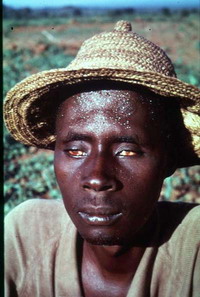River blindness may resist to one drug used to treat it
The parasite that causes river blindness, a crippling disease endemic in Africa and tropical regions of the Americas, may develop resistance to the one drug used to treat it.

The discovery could force public health officials to rethink strategies for controlling river blindness, also known as onchocerciasis. Currently there are 18 million cases in 36 countries worldwide - making it the second leading infectious cause of blindness.
In The Lancet study, researchers tested 2,501 people in disease-endemic regions of Ghana from 2004 to 2005, and found 19.5 percent had the worms that cause river blindness.
Doctors treated 342 people, from 10 communities within the regions, with ivermectin, and then tested them to see if immature worms were still in their system. Ivermectin only acts to kill young worms, so any adult worms in patients would still be present, even after treatment.
In four of the 10 communities, people were shown carrying a higher number of immature worms - the opposite result expected from the drug - suggesting the parasite was developing immunity.
"This finding represents a wake-up call that any parasite-control program that relies on a single antimicrobial agent is always at risk of derailment," wrote Dr. Peter J. Hotez, president of the Sabin Vaccine Institute, in an accompanying commentary in The Lancet. Hotez was not linked to the study.
River blindness is caused by a thin worm that can live for more than a decade in the human body. It is transmitted to humans by black flies, which lay their eggs in rivers. Each adult female worm - which can be more than a half-meter (half-yard) in length - produces millions of offspring that migrate throughout the body. The worms can cause intense itching, elephantiasis of the genitals and blindness if they reach the eyes.
Every year, public health officials give out more than 20 million doses of ivermectin, used to treat river blindness since 1987. Experts estimate the drug has prevented nearly 40,000 cases of blindness a year. To date, nearly US$600 million has been spent trying to eliminate river blindness from the world.
"It's not surprising that we're seeing some drug resistance," Hotez said. "You can't rely on a single tool without any backup." The emerging problem of resistance to this drug underlines the need to find new drugs and possibly even vaccines, he said.
Researchers identified some genetic changes in the disease-causing worm in Ghana and Cameroon, but could not explain what those changes meant exactly.
Genetic changes are "often the first sign the parasite could be developing drug-resistance, but it still needs to be investigated further," said Dr. Roger Prichard, the study's lead author and a professor at McGill University's Institute of Parasitology in Montreal.
Researchers suggested more testing needed to be done. If widespread resistance is detected, public health officials may have to redirect their control efforts to slow the trend, for example, by giving ivermectin only to infected patients rather than to entire communities at risk.
Alternatively, doctors could try another drug - some possibilities are in the pipeline, but none are ready at the moment.
Experts have acknowledged that relying exclusively on ivermectin was not the best strategy.
"It's been taken for granted for years that the river blindness problem has been solved because we have ivermectin," Prichard said. "But the problem has not been solved. We need another drug."
Subscribe to Pravda.Ru Telegram channel, Facebook, RSS!




